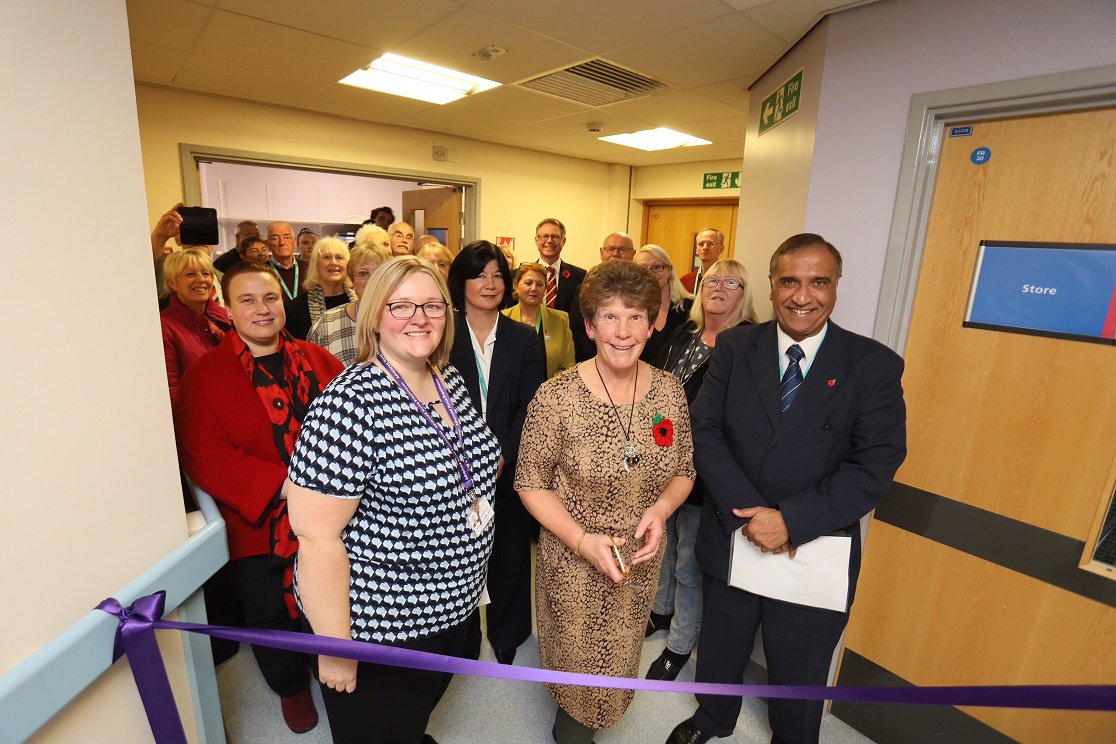The suite, which specialises in acute stroke care and cost over £1million, was named after Dr Huggett in recognition of the contribution she made to stroke and elderly medicine during her time with the Trust.
The Huggett Suite is the first of its kind for the Trust with the nearest acute stroke units based at hospitals in Blackpool, Chorley and Preston. Now patients in North Lancashire and South Cumbria will benefit from the unit which is based in the Centenary Building, and will provide the RLI with six acute stroke beds and an assessment bay.
Dr Huggett, who started working at the RLI in 1984, said: “I am absolutely thrilled to be here today and honoured to be officially opening the unit. This acute stroke unit is a big step forward in stroke services for Lancaster and for the Trust, with access immediately from A&E. What is also good is that they have the rehab facility within the unit so that this can be started straight away. Rehabilitation has always been important and always will be so it is excellent to have this all together.”
Patients suffering a stroke will now come into the Emergency Department (ED) at the RLI to be assessed for eligibility for clot-busting treatment in the department before being transferred to the new suite. There, they will be monitored by staff specially trained to care for patients immediately after a stroke. The suite is equipped with ceiling hoists to make lifting safer for patients and staff, continuous heart monitoring equipment, and patient therapy facilities including a therapy kitchen.
The Trust has recruited registered nursing, physiotherapy, occupational therapy and speech and language therapy staff. Before the suite opened, patients who had a stroke would come into ED and then go up to the Lancaster Suite, a general medical ward which houses stroke beds, before being transferred to Ward 23 for rehabilitation.
Now patients will come straight to a dedicated acute stroke bed on the Huggett Suite where they can be cared for by the specialist stroke team. Ward 23 in Medical Unit 2 at the RLI will remain as a rehabilitation facility for stroke patients who need longer term rehabilitation.
Linda Dunn, Clinical Lead for Stroke, UHMBT, who became a member of the stroke team in 2006, said: “I can honestly say that they broke the mould when they made Dr Huggett, she really has been an extraordinary doctor throughout her career. Stroke services at the RLI looked very different when I first started. Ward 23 provided stroke rehabilitation along side a number of specialities, there were no designated stroke rehab beds and acute strokes were admitted to wherever there was an empty bed. “Fast forward to 2016, following major investment into both the development of a dedicated acute stroke unit and stroke team staffing, the Huggett Suite was borne. The designated unit, with staff skilled in the management of acute stroke, will allow us to offer our patients the very best chance of recovery. Direct access to this type of unit with close monitoring and early intervention from a multi-disciplinary team is fundamental if we are to deliver outstanding stroke care. “I can categorically say that our patients are getting a better experience. Early performance data is suggestive that this has already led to an improved delivery of best practive interventions, which are directly associated with reducing mortality and morbidity and a shorter length of stay in hospital.”
Stroke is a medical emergency that occurs when the blood supply to the brain is interrupted by either a blockage or rupture of an artery in the brain. The lack of blood supply starves the brain cells of oxygen and nutrients, causing brain cells to become damaged or die. This damage can have different effects, depending on where it happens in your brain.

